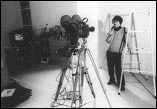|
|
 |
監督・撮影・編集:鈴木志郎康 Director, Photography, Editing : Suzuki Shiroyasu |
| 個人映画作家で詩人の鈴木志郎康は1975年に『日没の印象』を撮って以来、日記映画のスタイルを探し続けてきた。200分に及ぶ『草の影を刈る』は「枠付けした景色」という制度の中で一つの到達点を見せた。そして次作として15日間毎日自分にカメラを向けるという制度を考える。1979年11月19日から12月3日までの15日間、鈴木は毎日6分間づつ同時録音カメラで自分自身を撮り続ける。これは彼自身が課した日課である。しかし最初の数日間、我々は彼の日常が雑誌や新聞の原稿に追われ、夜昼逆転した生活をしているということ、そしてこの作品を撮ることへの後悔と言い訳を気弱に話す彼の後姿を見ることになる。まるで我々観客によって追い込まれるように彼は身を縮める。一週間が過ぎ、最初のラッシュが上がった頃に、彼はカメラに向かうときの対処の仕方を考え始める。こうして我々は、彼と共に彼の課した制度がいかなる結果を生み出すかを知ることになる。そして最後の日、彼なりにこの作品の本来向かうべき方向を見極めるのである。毎日6分という制約はあまり話すべきことがない日もあれば6分では喋りきれない日もある。カメラの廻る音は時には鈴木を責めるように、あるいは急かせるようにも作用し、撮る、あるいは撮られているという緊張感を我々観客にも強いることになる。 | Since he made the film Impressions of a Sunset ( " Nichibotsu no insho, " 1975), the independent filmmaker and poet Suzuki Shiroyasu has continued to explore the style of the film diary. In Harvesting the Shadows of Grass ( " Kusa no kage o karu, " 1977), a work of more than three hours, he reached a real level of achievement in terms of the method of " framed scenery. " In his next film, he came up with the method of pointing the camera at himself. For the " 15 days " from November 11 to December 3 1979, Suzuki recorded himself for six minutes each day using a camera with audio recording capabilities. This was a daily routine which he drew-up himself. However, for the first few days, we end up viewing him from behind, making weak excuses about his day to day existence being filled with deadlines for magazines and newspapers, moaning about sleeping during the day and working at night, and voicing his regrets about deciding to make the film at all. He shrinks as if cornered by the audience, and whilst we can sense slight variations in his daily sensibility, we are not able to ascertain much more than that. A week passes, and when the first rush has receded, he begins to think about how he should act in front of the camera. At this point we see the sort of results his method can bring. Finally, on the last day, he comes up with his own sense of the direction in which the work should go. With 6 minutes a day, there are some days in which he doesn't have much to say, and others when the time is just not long enough. Occasionally, the sound of the camera running seems to be torturing him or hurrying him along, and at times it even makes us, the audience, feel anxiety: as if we were ourselves being filmed. |